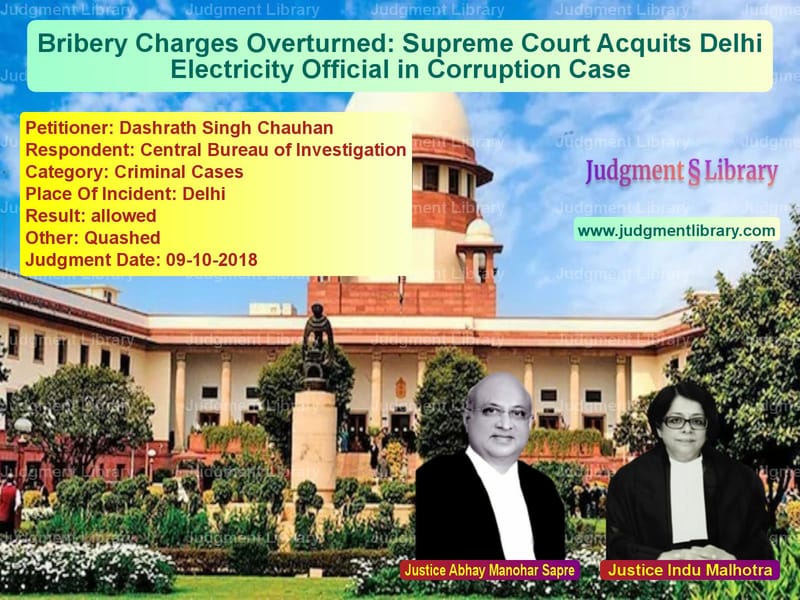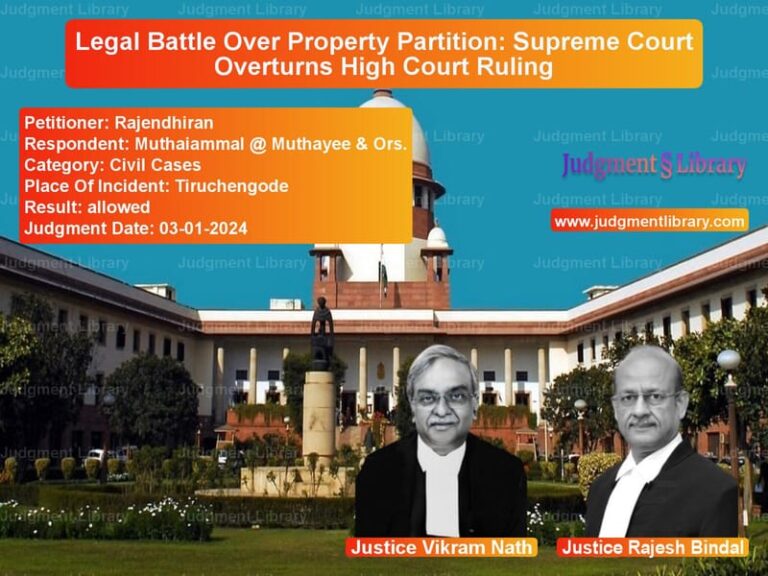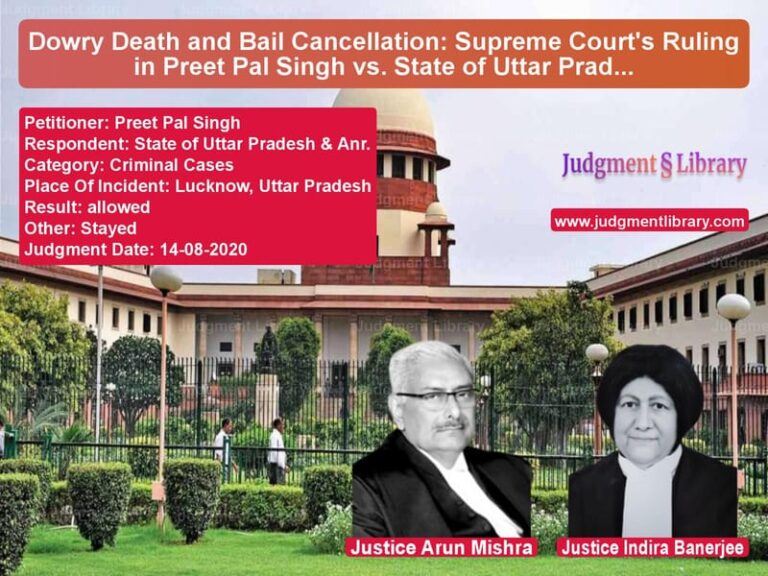Bribery Charges Overturned: Supreme Court Acquits Delhi Electricity Official in Corruption Case
The Supreme Court of India recently ruled on a corruption case involving an official from the Delhi Electric Supply Undertaking (DESU). The appellant, Dashrath Singh Chauhan, was convicted under the Prevention of Corruption Act, 1988, for allegedly demanding and accepting a bribe of Rs. 4,000. However, the Supreme Court overturned his conviction, citing a lack of evidence on the key element of ‘acceptance’ of the bribe. The ruling clarifies the strict requirements for proving corruption charges under Indian law.
Background of the Case
The case dates back to 1995, when the complainant, Arun Kumar, applied for an electricity connection for his factory. He alleged that Dashrath Singh Chauhan, an inspector at DESU, demanded a bribe of Rs. 4,000 to process the application. Based on this complaint, the Central Bureau of Investigation (CBI) conducted a trap operation.
On March 29, 1995, the complainant approached Chauhan to pay the bribe under the supervision of CBI officers. However, instead of directly accepting the money, Chauhan allegedly told the complainant to hand over the amount to another DESU employee, Rajinder Kumar. The CBI arrested Rajinder Kumar with the money in hand.
The trial court convicted Chauhan under Sections 7 and 13(2) read with Section 13(1)(d) of the Prevention of Corruption Act and sentenced him to two years in prison along with a fine of Rs. 40,000. The Delhi High Court upheld the conviction, leading Chauhan to appeal to the Supreme Court.
Key Issues Raised
- Was the prosecution able to prove that Chauhan directly accepted the bribe?
- Could the conviction be sustained merely on the allegation that the bribe was accepted by another individual on Chauhan’s behalf?
- Did the High Court err in affirming the conviction despite the trial court rejecting the conspiracy charge?
Arguments of the Petitioner (Dashrath Singh Chauhan)
- There was no direct evidence showing that he accepted the bribe.
- Since Rajinder Kumar was acquitted of all charges, the same logic should apply to him.
- The trial court dismissed the conspiracy charge under Section 120-B IPC, meaning there was no proof that Rajinder Kumar accepted the bribe on his behalf.
- The conviction was solely based on the testimony of a shadow witness (PW-2) and should not be sustained.
Arguments of the Respondent (CBI)
- The complainant’s testimony clearly established that Chauhan had demanded the bribe.
- The complainant was explicitly instructed by Chauhan to hand over the money to Rajinder Kumar.
- Even though Chauhan did not personally take the money, he had orchestrated the transaction, making him liable under the Prevention of Corruption Act.
- The High Court had rightly upheld the conviction based on circumstantial evidence and the credibility of witness testimonies.
Supreme Court’s Analysis
The Supreme Court examined the case under the fundamental requirements for proving corruption charges:
- The prosecution must prove both ‘demand’ and ‘acceptance’ of the bribe.
- Since Rajinder Kumar had been acquitted and the conspiracy charge was dismissed, there was no legal basis to hold Chauhan responsible.
- The trial court had rejected the testimony of CBI Inspector Kaul (PW-6) due to his questionable credibility.
- The prosecution failed to establish a conclusive chain of evidence linking Chauhan to the actual receipt of the bribe money.
In its ruling, the Court stated:
“The prosecution must prove beyond reasonable doubt that the accused not only demanded the bribe but also accepted it. In this case, while demand is alleged, acceptance is not proved against the appellant.”
Final Judgment
The Supreme Court set aside Chauhan’s conviction and ruled:
- The appellant was acquitted of all charges under Sections 7 and 13(2) read with Section 13(1)(d) of the Prevention of Corruption Act.
- The two-year prison sentence and the Rs. 40,000 fine were nullified.
- If Chauhan was out on bail, there was no need for him to surrender.
The judgment concluded:
“Since the prosecution has failed to prove acceptance of the bribe, the conviction under the Prevention of Corruption Act cannot be sustained.”
Implications of the Judgment
This ruling has significant implications for corruption cases in India:
- Strict Proof Requirements: Courts must ensure that both demand and acceptance of bribes are proven beyond doubt before convicting an individual.
- Precedent for Future Cases: If an intermediary accepts the bribe and is acquitted, the principal accused may also benefit from the acquittal unless direct involvement is proven.
- Strengthened Legal Safeguards: This case reinforces the importance of fair trials and prevents wrongful convictions based on weak evidence.
- Higher Standards for Prosecution: Law enforcement agencies must present conclusive evidence of both elements (demand and acceptance) to secure convictions in bribery cases.
This judgment serves as a reminder that corruption laws must be applied rigorously, ensuring that convictions are based on concrete evidence rather than presumptions.
Petitioner Name: Dashrath Singh Chauhan.Respondent Name: Central Bureau of Investigation.Judgment By: Justice Abhay Manohar Sapre, Justice Indu Malhotra.Place Of Incident: Delhi.Judgment Date: 09-10-2018.
Don’t miss out on the full details! Download the complete judgment in PDF format below and gain valuable insights instantly!
Download Judgment: Dashrath Singh Chauh vs Central Bureau of In Supreme Court of India Judgment Dated 09-10-2018.pdf
Direct Downlaod Judgment: Direct downlaod this Judgment
See all petitions in Fraud and Forgery
See all petitions in Bail and Anticipatory Bail
See all petitions in Extortion and Blackmail
See all petitions in Judgment by Abhay Manohar Sapre
See all petitions in Judgment by Indu Malhotra
See all petitions in allowed
See all petitions in Quashed
See all petitions in supreme court of India judgments October 2018
See all petitions in 2018 judgments
See all posts in Criminal Cases Category
See all allowed petitions in Criminal Cases Category
See all Dismissed petitions in Criminal Cases Category
See all partially allowed petitions in Criminal Cases Category







